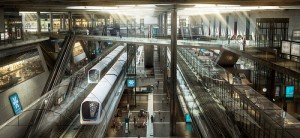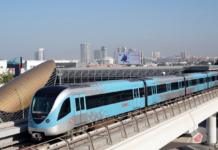Source: www.gulf-times.com
Qatar has made progress with infrastructure schemes that form a central part of the World Cup preparations, Meed said in its latest issue.
 “With just 10 years until Qatar hosts the FIFA World Cup in 2022, Doha is focusing its attention on building the infrastructure required to host the event,” it said. In April, Qatar Railways Company (QRail) issued tender documents for five major construction packages on the multi-billion dollar Doha Metro project.
“With just 10 years until Qatar hosts the FIFA World Cup in 2022, Doha is focusing its attention on building the infrastructure required to host the event,” it said. In April, Qatar Railways Company (QRail) issued tender documents for five major construction packages on the multi-billion dollar Doha Metro project.
The 300km-long Doha Metro System will consist of four lines – the Red Line, Gold Line, Green Line and Blue Line. The project will have some 80 stations by the time it is completed, Meed said.
The metro will link the New Doha International Airport to the centre of Doha and will connect some of the stadiums to be used for the 2022 World Cup. “Qatar is also pressing ahead with plans to spend QR100bn over the next five years on building and upgrading roads and drains throughout the country,” Meed said.
Ashghal (Public Works Authority) recently awarded a QR3.5bn construction deal to South Korea’s Hyundai Engineering & Construction to build the Lusail Expressway in Doha, which will link the Lusail development to the centre of Qatar’s capital city.
The road project is an important part of the World Cup plans, Meed said, as the Lusail Development will accommodate the Lusail iconic stadium, the largest planned sports arena for the event, which will have the capacity to hold more than 80,000 people.
“After little construction activity in 2011, Doha has begun to move forward with several infrastructure schemes in 2012. Delivering the metro and road projects in the required timeline will provide a tough challenge for clients and contractors and the infrastructure will need to be completed before work on the sporting infrastructure begins,” Meed said.
Although 10 years seem like a long time, building $20bn worth of road schemes, a multi-billion dollar metro network and $4bn worth of sporting facilities is set to provide planning and logistical challenges.“Doha has realised that to complete everything within the set timeframe, it has to focus on essential projects. “Before Qatar was selected to host the World Cup, its development plans were focused on economic diversification targets set out in its 2030 Vision Plan. With the country now set to host one of the world’s largest sports events eight years before, Doha has shifted its focus to 2022,” Meed said.



















